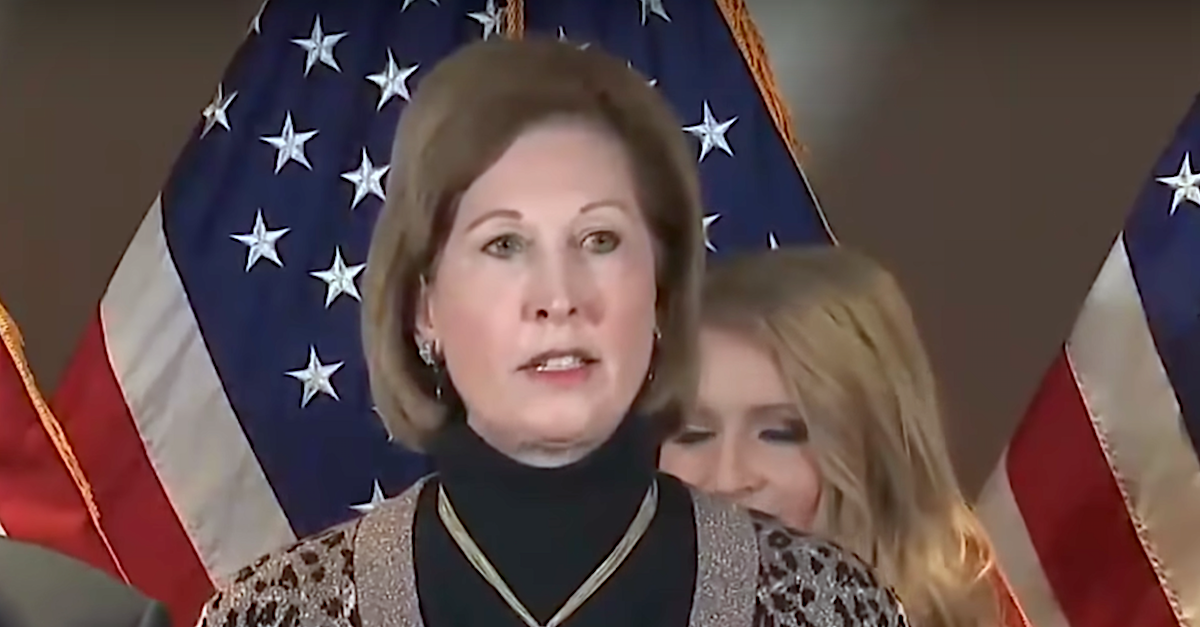
Sidney Powell and her “Kraken” associates on Friday asked the U.S. Supreme Court to overturn the results of the 2020 presidential election, asserting that the certification of election results in four states Donald Trump lost was unconstitutional. The latest “Kraken” filing included some head-scratching errors, procedural mistakes, and falsehoods that legal commentators were quick to comment on.
Powell asked the justices to consolidate four cases filed with the court earlier this week challenging the election results in Georgia, Michigan, Arizona, and Wisconsin. Those cases seek “emergency declaratory relief” saying that the election certifications in those states were “unconstitutional and otherwise contrary to law.” But the high court only has two of those “Kraken” cases (Georgia and Michigan) on its docket, because both the Arizona and Wisconsin petitions were apparently rejected.
“The Arizona and Wisconsin Petitions were electronically filed and hand delivered to the Court on December 12. Nonetheless, on December 17, the Clerk’s office marked both ‘Rejected’ on the Court’s ECF database,” the motion stated. “When inquiry was made about this notation, undersigned counsel was informed that a Clerk’s Office analyst had disallowed them, for reasons unspecified, without participation by any Justice of the Court. Counsel was informed that an explanation would be provided via U.S. Mail.”
The motion styled itself as follows:

As attorney Akiva Cohen pointed out in a protracted Twitter thread pointing out the filing’s many deficiencies, “cases have to exist in order to be consolidated, and the cases don’t exist until they’re docketed.”
Powell et al. then blamed the petition rejections on the Supreme Court’s clerk.
“We find this (presumably innocent) lapse atypical of the proud traditions in the Office of the Supreme Court Clerk. More important, we are confident that deficiencies in the Arizona and Wisconsin Petitions, if there be any, are curable. We respectfully request that the Court deem those submissions filed nunc pro tunc and consolidate them, once filed, with the Michigan and Georgia Petitions.”
“No no no no. Don’t do this. Good golly no,” said an apparently astonished federal appellate attorney Matthew Stiegler. “I cannot express how relieved I am that such evil is presented with such stupidity.”
The motion also falsely claims that all four states have “competing slates of electors” that have “received the endorsement of the legislatures in each of these States.”
“[T]here are now competing slates of electors from the four states at issue in the four cases mentioned above, (as well from Nevada, New Mexico, and Pennsylvania),” the motion said. “These four slates of electors have received the endorsement of the legislatures in each of these States, as reflected in permission for them to cast (or attempt to cast) their electoral votes, as an electoral body, for President Donald J. Trump in the respective State Houses at the time and place as set forth under applicable State law, the Electoral Count Act, and the authority delegated under the U.S. Constitution’s Electors Clause. U.S. Const. Art II, § 1, cl. 2.”
This is not true. The results in every state have been certified and the Electoral College votes for Joe Biden were already cast. There is no constitutional provision allowing for states to have an “alternate slate” of electors.
“There’s brazenness. There’s stupidity. I don’t think words have yet been invented to describe telling the Supreme Court that a ‘Republican slate of electors’ voted in Michigan while citing a report that says, ‘The GOP legislature refused to appoint alternate electors,’” Cohen wrote.
In fact, the Georgia General Assembly wasn’t even in session when Powell filed the initial petition.
Attorney Howard Kleinhendler, who signed the brief, told Reuters legal reporter Brad Heath that legislatures gave “implied consent” in that “the electors were allowed into the capitol” to vote (with the exception of Michigan, where the “alternate electors were refused entry into the capitol”).
“Allowing people to use a meeting room in the same building is not ‘the endorsement of the legislatures.’ (And *disallowing* people from using a meeting room inside is DEFINITELY not endorsement.),” attorney Mike Dunford wrote. “You’re lying to the court, Sidney. Stop doing that.”
https://twitter.com/questauthority/status/1340028445535989767?s=20
Read the full motion below:
Sidney Powell SCOTUS Filing by Law&Crime on Scribd
[image via YouTube screengrab]